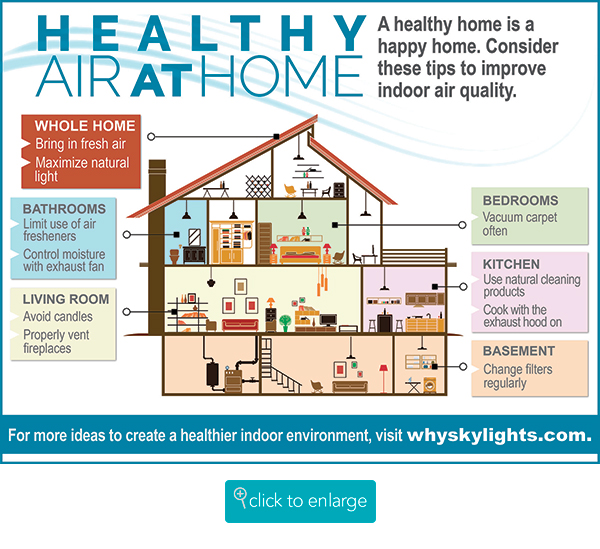Home Upgrades to Improve Indoor Air Quality
Jun 21, 2021 04:35AM ● By Family Features
When most people think about air quality, they’re typically thinking about outdoor pollution. However, according to the U.S. Environmental Protection Agency (EPA), the air inside your home can be as polluted, or even more so, than the air outside. The concentrations of some indoor pollutants can be as much as 2-5 times higher than typical outdoor concentrations.
The air inside your home also contains pollutants from everyday activities like cooking, bathing and cleaning. A family of four can produce the equivalent of 22-30 pounds of moisture per day from normal activities, according to the Institute of Specialist Surveyors and Engineers, while household cleaners and products like paint, upholstery, carpeting and plastics can release chemicals containing volatile organic compounds.
On average, Americans spend an estimated 90% of their time indoors, according to the EPA. All that time with minimal access to daylight and fresh air can take a toll on your health. These steps for managing indoor air quality can help you create a healthier home.
Support your HVAC system
Many homeowners assume their heating and cooling (HVAC) system is adequate to manage their home’s indoor air quality. Typically, these systems only circulate existing indoor air, so you’re missing out on the benefits of circulating fresher, cleaner air.
What’s more, without regular servicing and frequent filter replacements, it’s easy for standard HVAC systems to fall short. This is especially true in older homes or in households where there’s a high volume of allergens like dust or pet dander. Adding standalone or integrated devices can help give your HVAC system some extra support. Air purifiers can effectively help filter pollutants while ultraviolet lights purify the air and help control pollutants like bacteria, mold and mildew.

Improve fresh air ventilation
When it comes to upgrades that improve air quality, better fresh air ventilation is near the top of the list for many homeowners. Improved ventilation allows you to clear out stale, polluted indoor air and circulate fresh, outdoor air in your home.
Polluted air tends to stagnate at the ceiling, so one effective and energy-efficient way to create natural ventilation is with skylights that open. Sometimes called venting or operable skylights, when you open skylights in combination with vertical windows, you create natural airflow that can help release indoor air pollutants and bring in fresh, clean air to keep your home healthy and pleasant. This concept is known as the chimney effect. Warm air naturally rises and escapes from open skylights while fresh air is drawn inside through the windows. This practice can reduce your reliance on air conditioning, improving your home’s overall efficiency and keeping a lid on cooling costs.
Today’s skylights can also be automated to open and close at regular intervals or extend and retract shades to block light as needed. Many models, including those from Velux, can even connect to a smartphone app to combine convenience with a soothing mood booster that supports health and wellness.
Keep up with cleaning
Textiles like carpeting, rugs and window treatments can harbor a great deal of dust and dander that reduces air quality. It’s important to regularly clean and air out these decorative fabrics and surfaces, especially thick carpet that is likely to host dust mites and bacteria. Remember air quality while you’re cleaning, too, and opt for cleaning products with fewer chemicals. When possible, use microfiber cloths and natural materials like white vinegar and soap flakes.
With proper upgrades, adjustments and care, you can enjoy a home filled with fresh, healthy air and comfortable surroundings year-round. Learn more at whyskylights.com.




